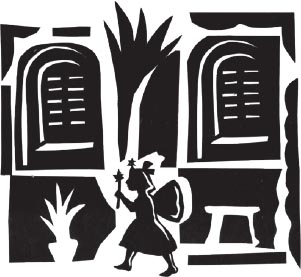
Early memory iv
My fairy doll
I vividly remember forgetting things – it seems paradoxical, but there was a word which I tried to recapture by retracing my steps back into the kitchen where I had left it, it seemed to me. Abdel and Mohammed raised themselves from their mats with smiles and warmth and wanted to help me – did they start up as I came in for some reason? I liked them both; their bright faces looked at me as if amused by me, but kindly, and when they were resting in the heat of the afternoon, they faced me levelly, I remember, since they were now on their elbows on their sleeping mats asking me what I needed. They had strong feet, dust mapping the wrinkles, but supple and lively, like all feet that are rarely shod or only wear slippers when they are.
The word or words that I was trying to find in the kitchen never came back to me and the sensation of missing them persisted as I turned and went back into the passage that ran down the centre of the apartment, which was where the dusk and the cool were deepest. Walking into a shuttered dwelling place in a hot country, touching a floor that’s hard and smooth and still and cold under my feet, seeing the only light haloing the edges of the windows, pressing to gain entrance and spill through every space in this interior darkness that resists its blaze still gives me the sensation of quiet and happiness of those times when I roamed our Cairo flat when everyone was having a siesta.
I suppose losing a word and chasing after it would figure strongly in a psychoanalytic session, and it is indeed the first time I experienced the absence of something that had been a part of me – a magic word that caught something particular that I wanted to retrieve, and had been lost with the naming of it. I see now that I have lost their voices and their words: I no longer speak even the childish Arabic I knew then, and it lies beyond my range to project thoughts and words into their minds at this distance; although I believe writing should roam beyond the writer’s experience, it feels wrong now, with these unequal relations in the past, to lay claim to knowing how Mohammed and Abdel – and Nanny – thought and felt. At least I know their names: she, whom I loved for the atmosphere she wrought around her, was not called by us by her own name.
Later, I also lost something else besides words, something which seems absurdly apt – to the point of self-parody. My fairy queen dropped her wand.
I searched up and down the sandy path leading to Gezira Sporting Club, poking in the mangy grass that edged it; Nanny urged me on, but I refused to allow her it was a lost cause. My doll’s hand was a stump with no fingers, but a flap stitched over a narrow aluminium stem with a silver paper star on the end. This hadn’t been done tightly enough, and you could slip the wand out of her grip and wave its star over other toys, playing the fairy. She was soft-bodied, with stuffed pink cotton limbs, a perky pink-cheeked face and another star on her forehead, a white tulle and satin dress and tiny gauze wings on her back. She had begun, poised on her tiny narrow stitched feet, at the top of the Christmas tree, but she had become mine after her descent, and I carried her with me every day.
Later, Mummy made me a fairy queen fancy dress; a family snapshot shows me, a podgy child bedizened in white lace and satin, yet glorying in the gauze moth wings on my back and the magic wand in my hand.